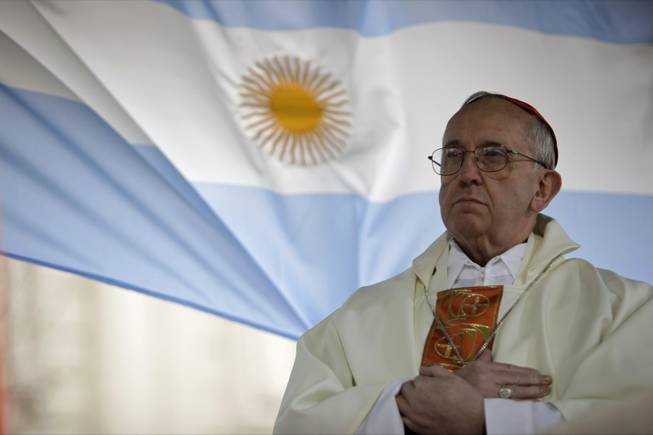
Natacha Pisarenko, file / AP
This Aug. 7, 2009 file photo shows Argentina’s Cardinal Jorge Bergoglio giving a mass outside the San Cayetano church in Buenos Aires. Bergoglio, who took the name of Pope Francis, was elected on Wednesday, March 13, 2013 the 266th pontiff of the Roman Catholic Church.
Thursday, March 14, 2013 | 12:36 a.m.
VATICAN CITY — In choosing a name no other pope had ever taken, Pope Francis could be signaling that he sees the need for change in the Roman Catholic church.
The name recalls two of the church's most famous saints.
One is Francis of Assisi, the man from the Umbrian hill town who renounced a wealthy, dissolute lifestyle to found the Franciscan order of friars in 1209, embracing a life of poverty and simplicity and going out in the countryside to preach a message of joy and peace.
The other is Francis Xavier, a globe-trotting Spaniard who became one of Christianity's greatest missionaries, and was a founding figure of the Jesuit order, of which the new pope is a member.
Pope Francis didn't cite either of those famous men when he made his first public speech as pontiff on Wednesday night, but within an hour of his presentation to the world from the central balcony of St. Peter's Basilica, his choice of name was being hailed as heralding what could be his priorities — and perhaps style — at the helm of a troubled church.
Umbria's bishops sent congratulations in a message noting that the new pope had taken up name of the saint of Assisi, one of Italy's patron saints who in his time sought to "renew the church."
"It was precisely Francis the Lord asked to repair his church in ruins," the bishops said.
Pope Francis' predecessor, Benedict XVI, had explained his resignation last month — the first pontiff to step down in 600 years — by saying he didn't have the mental or physical stamina to shepherd the church, rocked by scandals and confidential leaks in the Vatican's bureaucracy and losing many faithful to secularism or more dynamic forms of worship.
Since Francis is associated with peacemaking, the choice of name could foretell the pope's priority to bring a sense of serenity to a church feeling rudderless by Benedict's departure.
It's "striking that the new pope has chosen the name Francis," said Jonathan Seitz, a professor of history and politics at Drexel University in Philadelphia. "This is a little like old-style Kremlinology, but these choices are made with the purpose of sending a message."
While St. Francis is known to his followers for embracing poverty and simplicity, the friar "sought a reformation and a rebuilding of the church, seeking to act in the world rather than withdraw from it. The implication to me from the choice of a new name, and the name chosen, is that a change is in store," Seitz said.
Both the last two previous popes, John Paul II and Benedict, had set as a key aim of their papacy the rejuvenation of their flock, especially in Europe, where many have left the church, many because of the sexual abuse scandals. They also worried about the defection of souls to lively evangelical churches, especially in Latin America, which accounts for 40 percent of the world's 1.2 billion Catholics.
Although both Francis of Assisi and Francis Xavier could have inspired the new pope in selecting his name for posterity, it was more likely the Italian friar who was the main inspiration, said Monsignor Raymond J. Kupke, a professor of church history at Seton Hall University in New Jersey.
"He was a man of great simplicity, down to earth, a man of the people," Kupke said. "Also Francis of Assisi spearheaded a great evangelization movement of the 13th century. He embraced a new way of being religious in the world."
Choosing a name no other pope has picked also might say something of the courage the Argentine pope might bring to his mission.
"It takes a certain kind of chutzpah (to pick) a brand-new name, not honoring someone in the past," Kupke said. "It means you are looking in a whole new different direction."
Choosing the name of one of Italy's patron saints also ties the new pope to Italy, the homeland of all popes of the last few centuries until 1978.

Join the Discussion:
Check this out for a full explanation of our conversion to the LiveFyre commenting system and instructions on how to sign up for an account.
Full comments policy